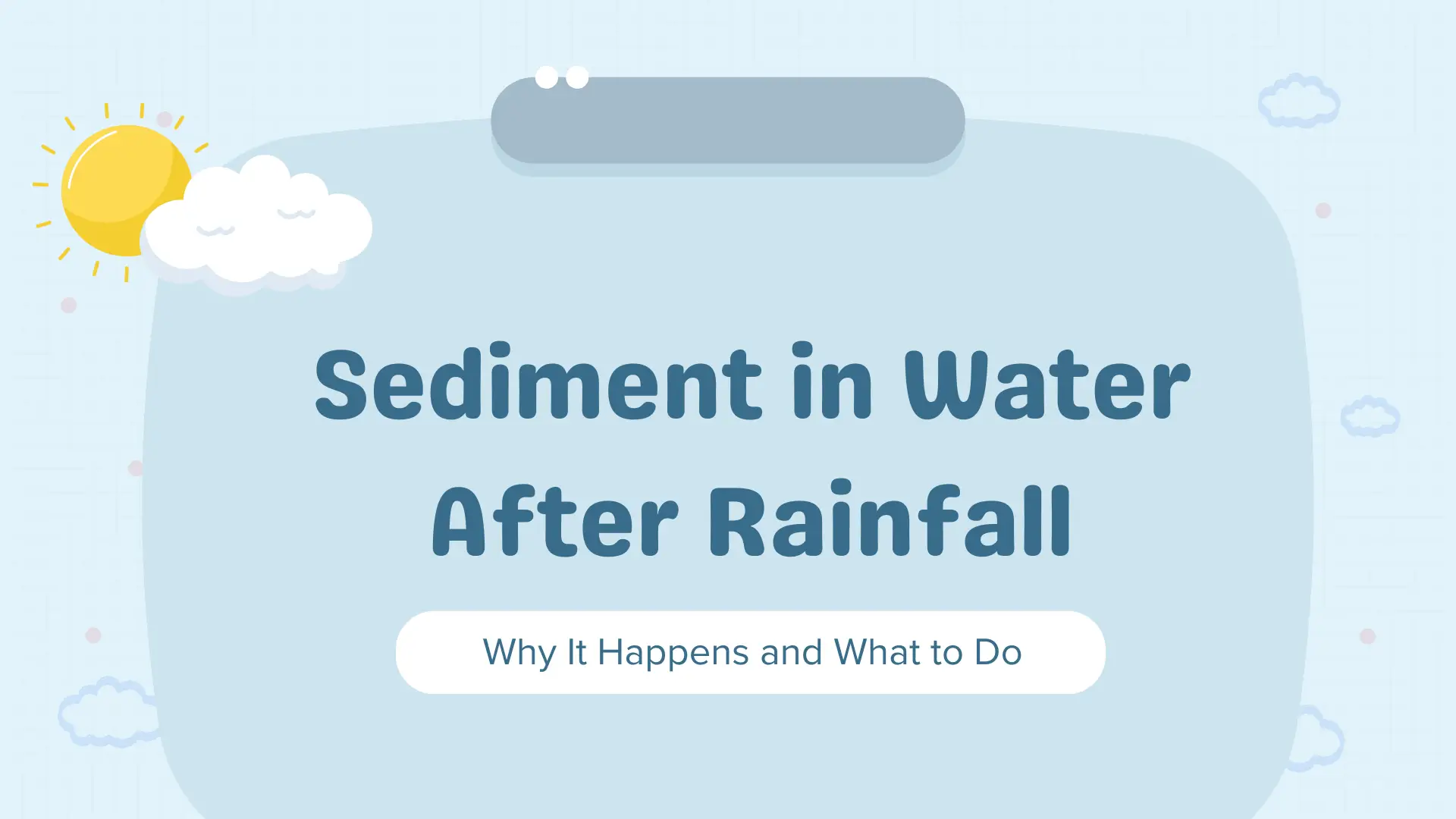When heavy rainfall sweep through San Antonio, many residents notice something unsettling when they turn on the tap: cloudy water, grit in the glass, or even strange odors. Sediment in water after rainfall is a common concern, but it can be more than just a cosmetic issue. For families and homeowners in San Antonio, sediment and contaminants can impact not only your health but also your appliances, plumbing, and overall quality of life.
This article will walk you through why sediment shows up in your water after rainfalls, what other contaminants could be present in San Antonio’s water supply, and most importantly, what you can do about it. We’ll also highlight how Aqua Pure, a Texas-owned and family-operated company, helps residents enjoy clean, safe water—backed with lifetime warranties, free installation, and flexible financing.
Why Sediment Appears in Water After Rainfall
1. Storm Runoff and Water Sources
San Antonio relies heavily on the Edwards Aquifer and surface water reservoirs. After heavy rains, storm runoff can carry soil, sand, organic matter, and industrial debris into water sources. Even though municipal treatment plants filter water, sudden spikes in sediment can overwhelm the system, allowing particles to pass through.
This is especially noticeable after intense thunderstorms or flash floods, when natural debris and organic matter enter the aquifer recharge zones. The result? Cloudy or gritty water flowing from your tap.
2. Aging Pipes and Distribution System
San Antonio’s water infrastructure, like that of many growing cities, includes older pipes that may be prone to corrosion or leaks. When rainfall increases water pressure or disrupts flow, loose rust and mineral deposits from these pipes may break free and end up in your tap water.
3. Construction and Development
With rapid growth across San Antonio, nearby construction sites often stir up dirt and debris. Rain washes these materials into drainage systems, which may eventually affect water clarity in certain neighborhoods. As new housing developments and roads expand, sediment disturbances become more common.
4. Groundwater Disturbances
Rainfall can also alter groundwater tables, stirring up natural sediment in wells or aquifers. This is especially common in private well systems around San Antonio’s suburban and rural areas.
What’s Really in San Antonio’s Water?
While sediment is the most visible contaminant after rainfall, there are other invisible impurities that can be just as concerning:
Hard Water Minerals (Calcium & Magnesium)
San Antonio is notorious for having very hard water. These minerals don’t just make soap harder to lather; they also cause scale buildup in pipes, water heaters, and appliances, reducing efficiency and lifespan. Hard water also makes dishes look cloudy and can leave clothes feeling stiff after laundry.
Chlorine
To keep water safe, the city adds chlorine as a disinfectant. While effective against bacteria, chlorine can leave water smelling and tasting unpleasant, and long-term exposure may dry out skin and hair. Many residents complain about the strong chlorine odor in their showers.
PFAS (Forever Chemicals)
PFAS, sometimes called “forever chemicals,” are man-made compounds linked to serious health concerns, including immune system effects, hormone disruption, and increased cancer risk. Although regulations are still evolving, PFAS can enter water through industrial runoff, especially after heavy rain events.
Sediment & Silt
Sediment itself isn’t always harmful, but it can clog plumbing, damage appliances, and provide hiding spots for bacteria. Sediment in water heaters can also reduce efficiency, leading to higher energy bills.
Other Possible Contaminants
- Iron & Manganese (can stain laundry and plumbing fixtures orange or black)
- Microorganisms (rare but possible after flooding or treatment disruption)
- Nitrates (from agricultural runoff, especially after rainfall)
- Disinfection Byproducts (formed when chlorine reacts with organic matter, which increases during storms)
How Sediment and Contaminants Affect Your Health and Home
Health Concerns
- Sediment may carry bacteria, parasites, or heavy metals.
- Chlorine byproducts can irritate sensitive skin and lungs.
- PFAS exposure has been linked to thyroid disease, developmental issues, and cancer.
- Nitrates are particularly dangerous for infants and pregnant women, interfering with oxygen transport in the blood.
Appliance Damage
- Sediment buildup in water heaters leads to higher energy costs.
- Dishwashers and washing machines wear out faster when exposed to hard water and grit.
- Coffee makers, ice machines, and other small appliances clog easily from sediment.
Plumbing Issues
- Sediment can settle in pipes, reducing water flow.
- Hard water minerals leave scale deposits that require expensive plumbing repairs.
- Corrosion from chlorine and mineral buildup can lead to leaks.
Daily Living
- Cloudy water discourages families from drinking tap water.
- Unpleasant tastes and smells drive up bottled water purchases.
- Showering in hard or chlorine-rich water leads to dry skin and brittle hair.
What San Antonio Residents Can Do
The good news is that you don’t have to live with sediment and contaminants in your water. Here are practical steps:
1. Get Your Water Tested
The first step is to know what’s in your water. Aqua Pure offers free water tests, helping you identify whether your water has sediment, hard water minerals, chlorine, or other contaminants.
👉 Request a Free Water Test today and get personalized insights into your home’s water quality.
2. Consider Filtration Systems
- Sediment Filters: Capture sand, silt, and rust before they enter your home.
- Carbon Filters: Reduce chlorine, odors, and some organic contaminants.
- Reverse Osmosis (RO): Highly effective for removing PFAS, nitrates, and dissolved solids.
- UV Purification: Eliminates microorganisms for added protection.
3. Install a Water Softener
For San Antonio’s famously hard water, a softener is almost essential. Softening protects appliances, improves soap efficiency, prevents scale buildup, and enhances daily comfort.
👉 Learn more about Aqua Pure Water Softeners.
4. Whole-House Solutions
A whole-home filtration and softening system ensures that every tap—from your kitchen sink to your shower—delivers clean, safe water.
5. Maintain Your System
Even the best system needs maintenance. With Aqua Pure, certified technicians handle everything from installation to maintenance, giving you a worry-free experience.
Why Choose Aqua Pure in San Antonio?
Aqua Pure isn’t just another water company. We’ve been serving Texas families for more than a decade, and our solutions are designed specifically for San Antonio’s unique water challenges.
Here’s why residents trust us:
- Free Installation & Support: No hassle—our experts take care of everything.
- Easy Financing: Affordable payment plans, no money upfront.
- $0 Down, Buy Now – Pay Later: Get clean water without the wait.
- Lifetime Warranty: Systems built to last, backed for life.
- Texas Owned, Family Operated: We understand local water problems because we live here too.
- 10+ Years of Trust: Proven solutions tailored for Texas homes.
- Customized Solutions: From sediment filters to advanced softeners, we design systems for your unique needs.
👉 Ready to improve your water quality? Get a Free Quote Today.
Local Tips for San Antonio Homeowners
- Flush Your Pipes After Storms: Run your tap for a few minutes after heavy rain to clear out loose sediment.
- Check Your Water Heater: Sediment often settles at the bottom of heaters. Regular flushing improves efficiency.
- Inspect Plumbing Fixtures: Faucet aerators and showerheads can clog with grit.
- Consider Appliance-Specific Filters: Protect ice makers, refrigerators, and coffee machines.
Frequently Asked Questions (San Antonio Residents)
Q: Why does my water look cloudy after it rains?
A: Rainwater runoff stirs up sediment in aquifers and pipes. While usually harmless, it can carry other contaminants, so testing is recommended.
Q: Is San Antonio’s tap water safe to drink?
A: Yes, it meets federal standards, but many residents still choose filters or softeners to remove sediment, chlorine, PFAS, and hard water minerals.
Q: What’s the best way to deal with hard water here?
A: A whole-home water softener is the most effective solution for San Antonio’s hard water. It protects appliances, plumbing, and improves daily comfort.
Q: Can I just boil my water to remove contaminants?
A: Boiling kills bacteria but won’t remove sediment, chlorine, PFAS, or hard minerals. A filtration system is more effective.
Q: How do I know which filter is right for my home?
A: Start with a free water test from Aqua Pure. Our experts will recommend a customized solution based on your water’s unique issues.
Q: Will a filter help with the chlorine smell in my shower?
A: Yes, carbon filters are highly effective at reducing chlorine taste and odor.
Q: Can sediment damage my washing machine or dishwasher?
A: Absolutely. Grit and minerals wear down moving parts, shorten appliance lifespans, and leave residues on clothes and dishes.
Q: Does San Antonio have PFAS in its water?
A: PFAS are an emerging concern nationwide. While not always detected in every local water test, rainfall can increase risks of runoff contamination. Reverse Osmosis filters are the best defense.
Final Thoughts
Sediment in water after rainfall is a real concern for San Antonio families, but it’s only part of the bigger picture of local water quality challenges. From hard water to chlorine and PFAS, your tap water can affect your health, your home, and your peace of mind.
Fortunately, with the right water treatment system—and the support of trusted local experts like Aqua Pure—you can enjoy crystal-clear, safe, and great-tasting water every day.
👉 Take the first step today: Request your Free Water Test or Quote from Aqua Pure.



